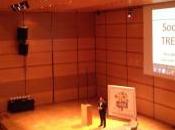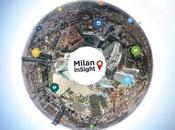Innanzitutto abbiamo chiesto ad Alessio come è nato il progetto TwitAntonio: è attualmente un'applicazione web ideata all'interno del raduno Spaghetti Open Data, una comunità molto liquida di italiani che "fanno cose con i dati".
TwitAntonio mostra i candidati alle elezioni che hanno Twitter: dalla schermata dell'applicazione è possibile mandare tweet a qualsiasi candidato e vedere alcuni aspetti della sua linea politica, come ad esempio lo schieramento a cui appartengono.
Abbiamo chiesto anche quale sia il quadro attuale per quanto concerne open data e hacking civico: si tratta di una situazione sicuramente molto stimolante, nel senso che ancora non sono stati ottenuti risultati veramente incisivi a livello nazionale, il che lascia spazio a moltissimo miglioramento. Allo stesso tempo non sono stati nemmeno rilasciati dataset veramente utili e incisivi, e spesso non sono nemmeno aggiornati.
La situazione ideale per quanto riguarda la trasparenza della pubblica amministrazione e la disponibilità di open data, sarebbe avere dati aggiornati regolarmente in base alla frequenza di raccolta del dato stesso: naturalmente è richiesta molta manodopera, un posto dove reperirli facilmente e - perché no - anche dei colleghi con cui lavorare per tirarne fuori informazioni utili alla cittadinanza.
Secondo Alessio esiste una tendenza "fuffologa" in rete, che spinge a credere che i dati abbiano un senso: i dati non hanno senso di per loro, bisogna interpretarli. Gli hacker civici dunque sono persone che si occupano di fare uno sforzo di fantasia per capire come declinare un dato che è grezzo, per farne app o per trarne insight. Esistono già diversi esempi virtuosi, come ad esempio l'app che avverte quando si entra in un quartiere a rischio di alta criminalità, oppure app che permettono ai cittadini di segnalare problemi di viabilità o decoro urbano.
In Italia c'è anche un problema in più, ovvero quello del campanilismo riguardante i dati: vengono infatti rilasciati sotto diversi formati, e sottoformati, il che rende difficile una normalizzazione del dato stesso. Per l'hacker civico diventa un'impresa titanica lavorarci su, motivo per il quale sarebbe auspicabile introdurre una qualche forma di legislazione in materia di open data: imporre agli enti pubblici un numero minimo di dataset da rilasciare in forma concordata, in modo che ci si possano costruire delle app. Attualmente il formato non è normato.
Gli open data rappresentano un importante strumento di democrazia, come affermato dallo stesso Alberto Cottica: entrare in contatto con i rappresentanti politici, avere insight approfonditi sulla efficienza della pubblica amministrazione, sulla sicurezza delle città, e persino sull'efficienza delle ambulanze e delle forze dell'ordine.
Naturalmente vi invito a visionare l'intervista integrale, ben più ricca di questa mia breve sintesi.
Maria Petrescu | @sednonsatiata
10minuteswith Alessio Biancalana
We interviewed Alessio Biancalana, one of the contributors of TwitAntonio. First of all we asked Alessio how the TwitAntonio project was born: it is currently a web application created inside Spaghetti Open Data, a very liquid community of Italians who "do things with data".
TwitAntonio shows the candidates to elections that have a Twitter account: from the application interface it is possible to send tweets to any candidate and see some aspects of their political position, such as the party they belong to.
We asked what the current situation regarding open data and civic hacking is in Italy: it is surely a very stimulating situation, because there haven't been any important results at a national level, which leaves space to doing much better. At the same time no datasets that are truly useful have been released, and often they're not even updated.
The data is released by the administrations in a easily readable format: the task of the civi hacker is to take the data and feed it to the machines, or write programs that use that data. Unfortunately both datasets and civic hackers are lacking, even though inside Spaghetti Open Data and Open Coesione there are many people who are doing their best to make a difference.
The ideal situation as for the transparency of the PA and the availability of open data would be to have regularly updated data, based on the frequency with which the data is collected: of course this requires a lot of work, and a place where you can easily find them and - why not - more colleagues to work with in order to get useful information out of them.
Alessio believes there is a tendency to say that data has a sense: data doesn't have any sense by itself, you need to read it and give an interpretation. Civic hackers are people who do a great fantasy work in order to understand how to use raw data, to make apps or get insights. There are already quite a few good examples, such as the app that gives an alert whenever you enter high risk neighborhoods, or the app that allows citizens to report problems with streets or urban decor.
In Italy there is also another problem, which is the randomness of data: they are released under several formats or subformats, which makes it difficult to normalize it. It becomes a huge task for the civic hacker, which is why it would be a great idea to introduce some laws regarding open data: for example, the PA should have to release a minimum number of datasets in a given format, and keep them updated, so that apps can be built upon them. Currently none of this has any legislation.
Open data represent an important tool of democracy and direct control, as Alberto Cottica has stated: getting in touch with political representatives, having in depth insights on the efficiency of the PA, the safety of the neighborhood, and even the efficiency of ambulances.
Of course, I invite you to view the full interview, much richer than my brief synthesis.
Maria Petrescu | @sednonsatiata




